Careers in the maritime industry are well-paid and a qualification from MIT’s New Zealand Maritime School (NZMS) could take you around the globe.
All seagoing ships, be they cruise liners, freighters or technical and research vessels, need physically fit, independent crew who work well as a team.
If you love the ocean and are good at technical subjects, launch your training at the best facility New Zealand has to offer.
Study options in Maritime

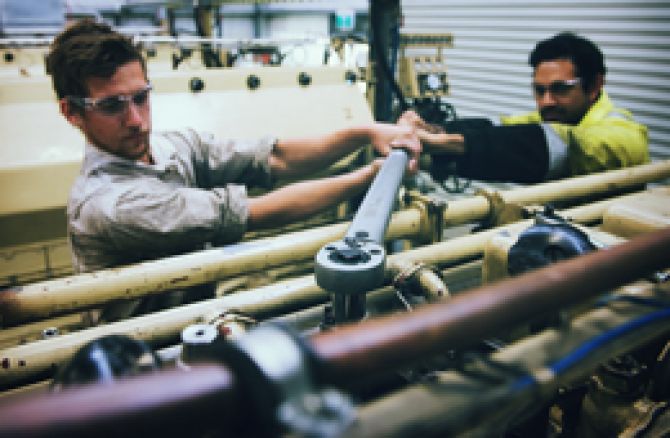
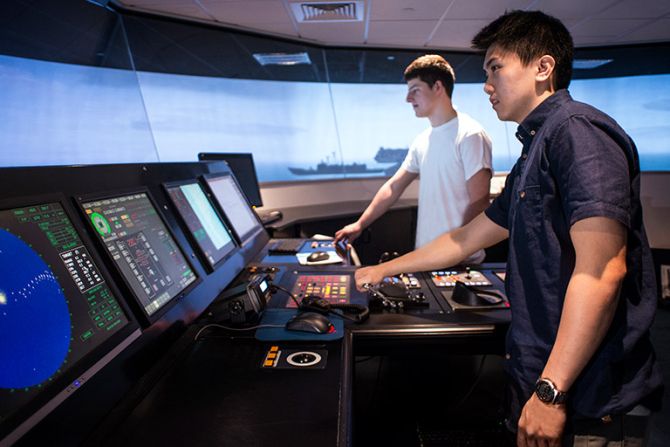
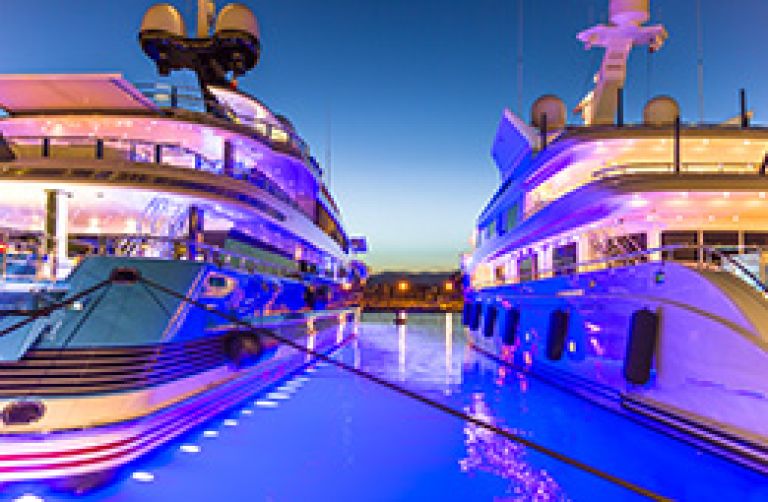
Domestic maritime
- New Zealand Certificate in Domestic Maritime Crewing (Level 3) also known as Qualified Deck Crew
- Six months to one year
- New Zealand Maritime School, Online
- February, March, May, July
- New Zealand Certificate in Marine Engineering Class 6 (Level 4)
- Less than six months
- New Zealand Maritime School, Online
- March
- New Zealand Certificate in Domestic Maritime Operations (Restricted Limits) (Level 4) also known as Skipper Restricted Limits
- Six months to one year
- New Zealand Maritime School, Online
- March, May, September, December
- New Zealand Certificate Maritime Operations with strands in Fishing, and Watchkeeping (Level 4) also known as Officer of the Watch 500GT Near Coastal/Mate Fishing Vessel – Limited
- Six months to one year
- New Zealand Maritime School, Online
- March
- New Zealand Certificate in Domestic Maritime Operations (Coastal and Offshore) (Level 5) also known as Skipper Coastal and Offshore
- Less than six months
- New Zealand Maritime School, Online
- March
- New Zealand Certificate in Maritime Operations (Level 5) also known as Master 500GT Near Coastal and Skipper Fishing Vessel – Limited
- Less than six months
- New Zealand Maritime School
- May
- New Zealand Certificate in Marine Engineering Class 5 (Level 5)
- Less than six months
- New Zealand Maritime School, Online
- March
Marine engineering
- New Zealand Certificate in Maritime Crewing (Level 4) with a strand in Engineering also known as Engine Watch Rating (EWR), STCW Able Seafarer Engine (AB Engine)
- Less than six months
- New Zealand Maritime School
- January
- New Zealand Diploma in Marine Engineering (Level 6) also known as Marine Engineer Class 3 (MEC 3)
- More than one year
- New Zealand Maritime School
- June
- Diploma in Foreign-going Master or Chief (Level 7) (Chief Engineering Foreign-going) also known as Marine Engineer Class 2 (MEC 2) or Marine Engineer Class 1 (MEC 1)
- One year
- New Zealand Maritime School
- January
Nautical foreign-going
- New Zealand Certificate in Maritime Crewing (Level 4) with a strand in Deck Crew also known as Deck Watch Rating (DWR), STCW Able Seafarer Deck (AB Deck)
- Less than six months
- New Zealand Maritime School
- January
- New Zealand Diploma in Nautical Science (Level 6) also known as Officer of the Watch or 2nd mates ticket
- More than one year
- New Zealand Maritime School
- June
- Diploma in Foreign-going Master or Chief (Level 7) also known as Chief Mate or Master
- One year
- New Zealand Maritime School
- Modular, February
Superyacht
- New Zealand Certificate in Maritime Crewing (Level 3) in Superyacht Crewing
- Less than six months
- New Zealand Maritime School
- January, May, August
- New Zealand Diploma in Yacht Operations (Level 6) with optional strand in Master Yacht also known as Chief Mate Yacht/ Master Yacht
- One year
- New Zealand Maritime School, Online
- March, May, August
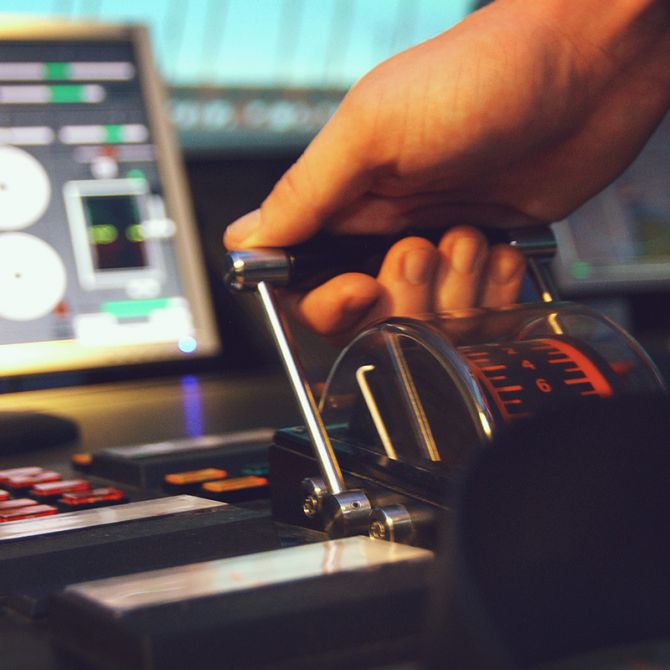
See why more people choose Maritime at MIT
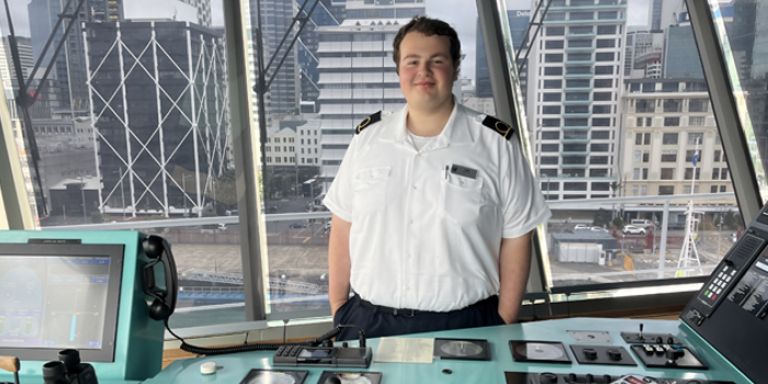
“During my time at sea, I’ve discovered a genuine passion for the maritime industry.”

“During my time at sea, I’ve discovered a genuine passion for the maritime industry.
The hands-on experience and challenges of working aboard cruise ships like the Noordam of Holland America Line have been instrumental in shaping my career. The dynamic environment of cruise ships has been both exhilarating and rewarding. Interacting with crew members and passengers from around the world has broadened my perspective and enhanced my professional experience.
As I continue to pursue my career at sea, I am grateful for the foundation and practical skills that I have acquired through my education at NZ Maritime School. Their support has been integral to my success in the industry, and I look forward to further developing my expertise and contributing to the maritime community.”
Toby Lakin
NZMS graduate

We are the quality choice. Study maritime and graduate work-ready.
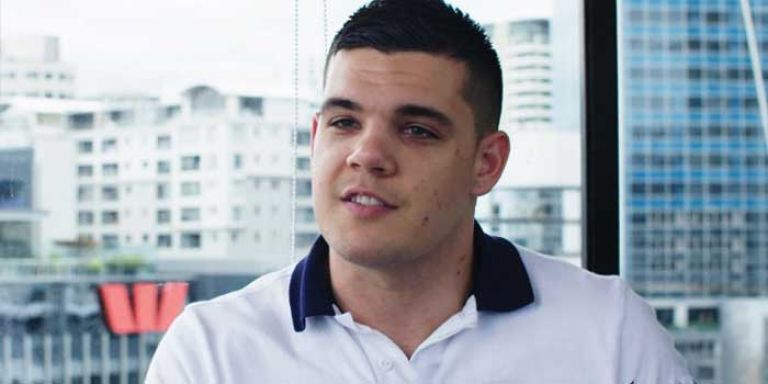
“It is important that you enjoy what you study. I have never looked back.”

“It is important that you enjoy what you study. At times you do need to push through some hard grafting as with all tertiary studies. Enjoying the little things really help to keep the drive and motivation high to succeed and throughout the hard grafting, whether I showed it or not, I was actually enjoying it. Without my qualification, I wouldn’t be eligible for the job. I qualified as a 2nd mate and went back for the mates masters course as soon as possible. Now I have my chief mates licence and I am getting promoted immediately.”
Joseph Cross
NZMS graduate
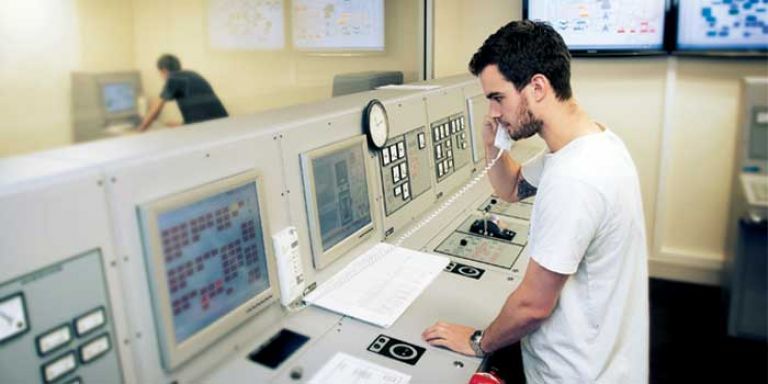
“It’s a great way to see the world.”

“Working on a cruise line, we get the opportunity to visit amazing places. I’ve been to Alaska, Canada, down the east and west coasts of America, through the Panama Canal, around Asia. All our travel is paid for, so it’s a great way to see the world.
As part of our training, we have to do six months of sea time, which gives you real-world work experience. Our lecturers are all from the industry – we learn subjects like maths and physics, but they make it relevant to marine engineering, so it means you get the knowledge you need for the real world.
If you’re looking for a job that lets you travel the world and pays well, definitely consider a career in maritime. It’s not always glamorous, you have to get stuck in and work hard, but it’s an awesome job. I couldn’t think of anything better to do.”
Matthew Hope-Johnson
NZMS graduate
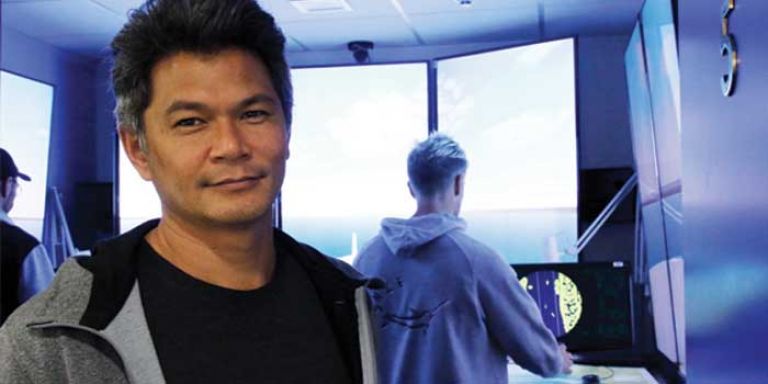
“The school here has really good, experienced lecturers.”

“After university, I was looking for something to do and volunteered to work on the Green Peace vessel Esperanza and that’s where I fell in love with working on the ocean. So from there, I moved into the yachting world and I’ve slowly been upgrading my certificates throughout my career. There’s lots of great opportunities.
The facilities here at this school are the best in the south pacific. I’m from Fiji so we don’t have these types of facilities there. Coming over here and learning in the simulator which is really quite real and helps out in real-life situations. The school here has really good, experienced lecturers. It’s a great campus. I really enjoy the camaraderie between all the students here. Everyone is very approachable.
I find being from the Pacific, the people here are a lot nicer. Very personable, very approachable. I’ve done extensive traveling. I’ve done the Pacific seven times, circumnavigated South America, all the East Coast of the States, the Mediterranean, the Caribbean. Always travelling and always checking out the world.”
Teh Chung
NZMS student
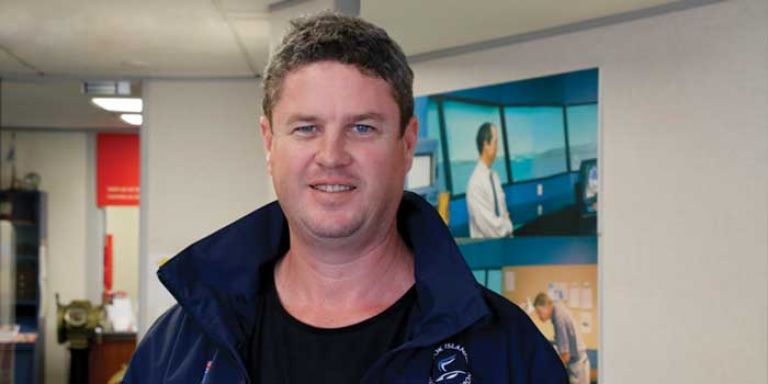
“The upward potential for salaries in the shipping industry is significant.”

“When you’re working on a ship, you’re not working 24 hours a day, but you’ll be working some odd hours. You’ll be working through the night most of the time for three or four hours. It’s an adjustment to your circadian clock. You don’t just wake up at 7, go to the office by 9, and get home by 5. The days vary and change all the time. The scenery’s changing. It’s interesting.
I think I’ve enjoyed most, the real-life simulations of situations that you encounter: the simulator exercises and working with other people on the bridge; making mistakes; talking about how those mistakes arose; ways you’d do it differently in the future. This has been really valuable and also enjoyable. The advantage of the simulator exercises, in particular, is that you’re forced to think about things that don’t normally happen to you, but might. That’s a huge benefit in terms of your overall awareness when you’re on the ocean and you’re dealing with a vessel where things can go wrong. It’s great reinforcement of the different scenarios that can arise and how to deal with them.
The upward potential for salaries in the shipping industry is significant. Across the industry, officers are generally pretty well paid. And of course, when you’re at work you don’t have any expenses. You’re fed and accommodated, flown to and from the vessel. There aren’t a lot of things to spend that salary on while you’re onboard.”
Garth Broadhead
NZMS student
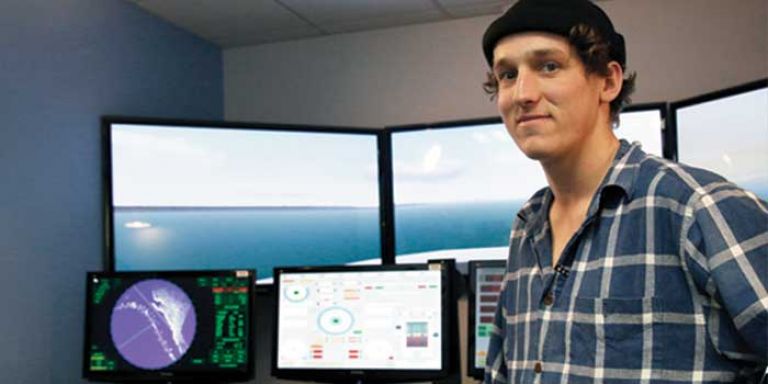
“A lot of the practical learning is done in the simulator.”

“I’ve always been interested in fishing and diving and doing a bit of sailing when I was growing up. I thought it would be a cool way to extend that hobby into a career. All the instructors are A grade. Top of the line.
A lot of the practical learning is done in the simulator. There’s fairly realistic situations the lecturers can put you into. They can turn up the sea, they can reduce the visibility. They can put you in quite a hectic situation which really makes you think on your feet. Much like the real world could be.
My ideal job would be working on a boat, going cool places, preferably warm, and being able to see some pretty cool places around the country and around the world eventually.
Studying at NZMS is definitely worth it. It’s a good way to progress and it can lead to some pretty cool opportunities in the marine industry.”
Jack Abbott
NZMS student

“There’s quite a lot of work out there if you’re able to get experience.”

“I’ve spent most of my life growing up, on and around water. My old man worked in the fishing industry and is a skipper.
I was living on Stewart Island so for me I wasn’t able to come here for three months with work, so the distance learning, doing it all online played a huge role in me actually being able to do this course.
Having a career at sea means you get to experience things you can’t experience because there are no roads. Seeing whales, seeing dolphins, penguins are not uncommon. Every year we’d see a few whales as we travel up the coast. You get to experience a lot of what NZ is meant to be like. Getting away from all these big cities. Experiencing the nature and peacefulness of it all.
Most of maritime is hands-on experience. You always learn under a particular skipper. So you learn their way of doing things. But by coming here you’re learning the standard of the industry. It gives you that theoretical knowledge of why you’re doing something.
There are 7 simulators with one that is practically a boat. So that’s great hands-on because you can operate in low visibility with targets. It’s the most realistic way of learning how to do a lot of these things without actually being on a boat.
There’s quite a lot of work out there if you’re able to get experience.”
Nic Marshall
NZMS student
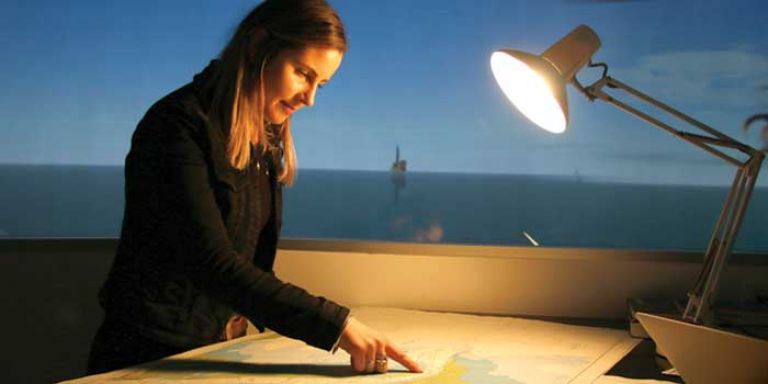
“I’ve just learnt so much more from being here.”

“I’ve never been a student, I was a little bit on the fence about it but once I got here everything just worked out perfectly. I’ve just learnt so much more from being here.
There’s about 20 plus of us most of the time on the course. It is a good number. There’s also people from different backgrounds and other courses incorporated into the modules which is really good because you get people who have been in completely different circumstances. We have fishermen, we have sailors, and we have people doing their Skipper Coastal Offshore.
The thing I love about the course here at the NZMS is they do put a lot of theory into practice. We spent two weeks in the computer laboratory room learning the programmes, especially the electronic chart display and GPS, all of our navigational aids, and radar set up. Then we come into the bridge and put it all into practice which has been really helpful.
We also get put into emergency situations which obviously day to day in our jobs, you hope you don’t really come across. For example, a full search and rescue where each boat had a full search pattern and we had to follow that, follow the instructions, and search for a life raft with a person who we did ultimately find. Something like that is really helpful because in the real world if that does happen, we will have this hands-on training to refer back to.”
Kate Williamson
NZMS student
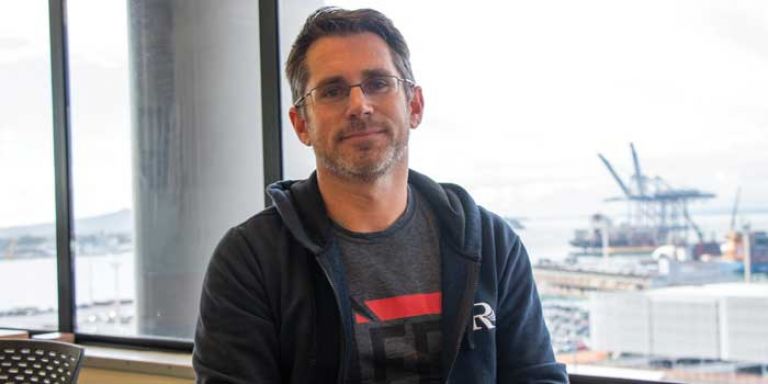
“I enjoy working on vessels because every day is different.”

“I started out here with my Marine Engineer Class 5 and I found the instructors through those years to be really amazing. The tutors and instructors here are excellent. It’s probably the people here that makes the school. They bring a wealth of experience and years at sea so they can apply what you’re reading in books to a real-world scenario.
NZ Maritime School is rated really highly. I’ve done training overseas at other maritime schools and this school is really well regarded on an international standing that’s for sure. If you come here to the NZ Maritime School you can get a NZ commercial maritime licence while you’re training to get a superyacht licence. That’s very beneficial for students looking to come home from overseas from superyachts to work on the ferries or anywhere in NZ.
NZ maritime qualifications are also recognised in Australia so you can go and work in Australia no problem. I highly recommend going to Auckland to do it because you’ve got that adaptability in the future if you want to do something else in your career.”
Craig Coker
NZMS student
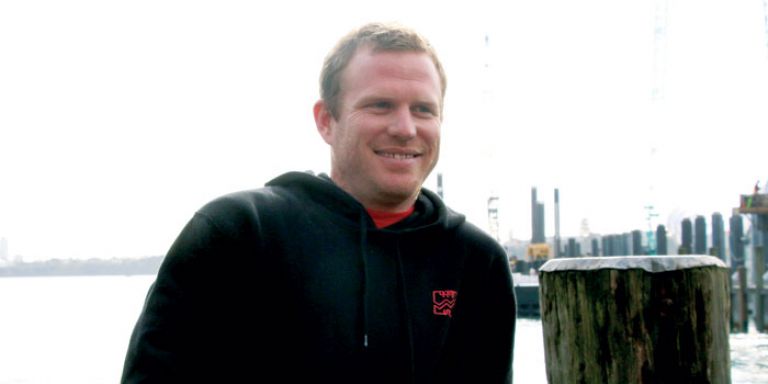
“A career at sea is different to anything else.”

“My background is in fishing in the family business with my brother.
The reason I love fishing is because I was bought up on the ocean. As a young kid, I used to go out with my Dad fishing. Constantly driving boats. A career at sea is different from anything else. If you like being on the water you’ll know what I mean. You go out at sea just to be there in that environment. It’s unlike anything else or any other job.
The NZMS is a good place to learn to get into the maritime industry, and it’s a good industry to get into. We started our course online, but when we got here we went onto the simulator so we learnt everything in the theory and then we went downstairs and they’ve got the awesome simulator, you are in a bridge of a boat – I’ve been driving boats for years, and it’s pretty real.
You can drive a container ship, or our final exam for nav aids was a 22mtr high-speed ferry, 50mtr fishing boats and the lecturers can change all the weather, all the tides, all the effects. It’s pretty cool. ”
Simon Macnicol
NZMS student
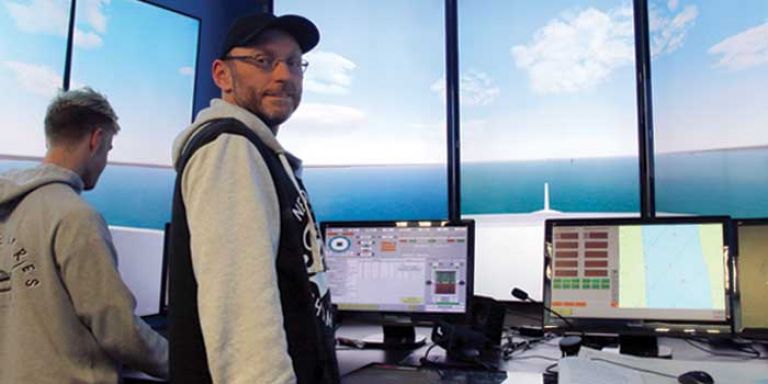
“I enjoy the hands-on approach. Building up confidence for real-life scenarios.”

“My old man has been in the merchant navy for most of his life and his father before him so it was a natural progression for me. I went into the fishing industry and haven’t looked back.
I enjoy the simulator the most at NZMS. The hands-on approach. Building up confidence for real-life scenarios. It’s hard being away from the family, but when you are home you’ve got a comfortable lifestyle and your family is able to see you. Get amongst it. It’s good fun. It’s definitely a good career path. It pays good.”
Sam Mitchell
NZMS student
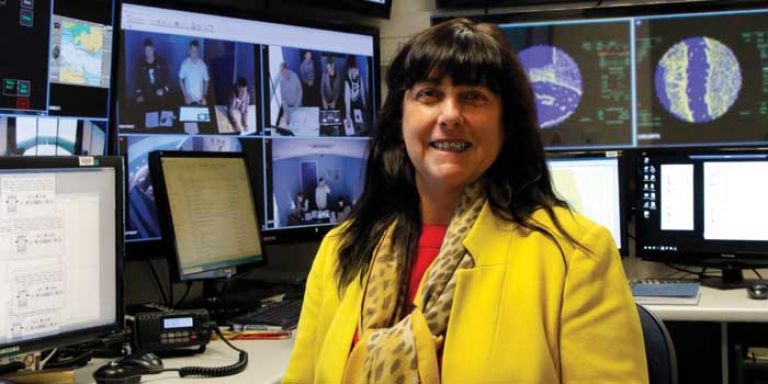
“We’ve got a really wide variety of domestic maritime programmes.”

“We’ve got a really wide variety of domestic maritime programmes. We have a couple of programmes like the super yacht certificate that are really good for people entering the industry who don’t have any industry experience. The rest of our programmes are really geared towards people who are already in industry and are actually doing at-work learning and workplace learning. So they could be for people who are working for ferry companies, tug operators, coastal research vessels, all the way through to the inshore fishing fleet, offshore fleet and we do have programmes for super yacht, chief mate and master.
Everything that we are talking about in the theoretical aspect has a practical application on the vessel. So even though we talk about theory it’s actually put into practice. One of the things we’re talking about is in the simulator here. We can talk about theoretical collision, prevention regulations, all sorts of things like that, but it’s actually doing it in something like the simulator that makes the difference. So where it can be, it’s always reinforced in a practical sense.
One of the things about working on-board a vessel is that you do have a routine but your routine is punctuated by difference every day. So even though you have a solid routine that runs through your ship when you’re navigating from A to B, things change all the time. So it’s always quite exciting. You never quite know what’s happening or coming up. When you look out your window you’re in an amazing environment that changes all the time.”
Louise Deehan-Owen
NZ Maritime School Senior Lecturer
See why more people choose Maritime at MIT

“During my time at sea, I’ve discovered a genuine passion for the maritime industry.”

“During my time at sea, I’ve discovered a genuine passion for the maritime industry.
The hands-on experience and challenges of working aboard cruise ships like the Noordam of Holland America Line have been instrumental in shaping my career. The dynamic environment of cruise ships has been both exhilarating and rewarding. Interacting with crew members and passengers from around the world has broadened my perspective and enhanced my professional experience.
As I continue to pursue my career at sea, I am grateful for the foundation and practical skills that I have acquired through my education at NZ Maritime School. Their support has been integral to my success in the industry, and I look forward to further developing my expertise and contributing to the maritime community.”
Toby Lakin
NZMS graduate

We are the quality choice. Study maritime and graduate work-ready.

“It is important that you enjoy what you study. I have never looked back.”

“It is important that you enjoy what you study. At times you do need to push through some hard grafting as with all tertiary studies. Enjoying the little things really help to keep the drive and motivation high to succeed and throughout the hard grafting, whether I showed it or not, I was actually enjoying it. Without my qualification, I wouldn’t be eligible for the job. I qualified as a 2nd mate and went back for the mates masters course as soon as possible. Now I have my chief mates licence and I am getting promoted immediately.”
Joseph Cross
NZMS graduate

“It’s a great way to see the world.”

“Working on a cruise line, we get the opportunity to visit amazing places. I’ve been to Alaska, Canada, down the east and west coasts of America, through the Panama Canal, around Asia. All our travel is paid for, so it’s a great way to see the world.
As part of our training, we have to do six months of sea time, which gives you real-world work experience. Our lecturers are all from the industry – we learn subjects like maths and physics, but they make it relevant to marine engineering, so it means you get the knowledge you need for the real world.
If you’re looking for a job that lets you travel the world and pays well, definitely consider a career in maritime. It’s not always glamorous, you have to get stuck in and work hard, but it’s an awesome job. I couldn’t think of anything better to do.”
Matthew Hope-Johnson
NZMS graduate

“The school here has really good, experienced lecturers.”

“After university, I was looking for something to do and volunteered to work on the Green Peace vessel Esperanza and that’s where I fell in love with working on the ocean. So from there, I moved into the yachting world and I’ve slowly been upgrading my certificates throughout my career. There’s lots of great opportunities.
The facilities here at this school are the best in the south pacific. I’m from Fiji so we don’t have these types of facilities there. Coming over here and learning in the simulator which is really quite real and helps out in real-life situations. The school here has really good, experienced lecturers. It’s a great campus. I really enjoy the camaraderie between all the students here. Everyone is very approachable.
I find being from the Pacific, the people here are a lot nicer. Very personable, very approachable. I’ve done extensive traveling. I’ve done the Pacific seven times, circumnavigated South America, all the East Coast of the States, the Mediterranean, the Caribbean. Always travelling and always checking out the world.”
Teh Chung
NZMS student

“The upward potential for salaries in the shipping industry is significant.”

“When you’re working on a ship, you’re not working 24 hours a day, but you’ll be working some odd hours. You’ll be working through the night most of the time for three or four hours. It’s an adjustment to your circadian clock. You don’t just wake up at 7, go to the office by 9, and get home by 5. The days vary and change all the time. The scenery’s changing. It’s interesting.
I think I’ve enjoyed most, the real-life simulations of situations that you encounter: the simulator exercises and working with other people on the bridge; making mistakes; talking about how those mistakes arose; ways you’d do it differently in the future. This has been really valuable and also enjoyable. The advantage of the simulator exercises, in particular, is that you’re forced to think about things that don’t normally happen to you, but might. That’s a huge benefit in terms of your overall awareness when you’re on the ocean and you’re dealing with a vessel where things can go wrong. It’s great reinforcement of the different scenarios that can arise and how to deal with them.
The upward potential for salaries in the shipping industry is significant. Across the industry, officers are generally pretty well paid. And of course, when you’re at work you don’t have any expenses. You’re fed and accommodated, flown to and from the vessel. There aren’t a lot of things to spend that salary on while you’re onboard.”
Garth Broadhead
NZMS student

“A lot of the practical learning is done in the simulator.”

“I’ve always been interested in fishing and diving and doing a bit of sailing when I was growing up. I thought it would be a cool way to extend that hobby into a career. All the instructors are A grade. Top of the line.
A lot of the practical learning is done in the simulator. There’s fairly realistic situations the lecturers can put you into. They can turn up the sea, they can reduce the visibility. They can put you in quite a hectic situation which really makes you think on your feet. Much like the real world could be.
My ideal job would be working on a boat, going cool places, preferably warm, and being able to see some pretty cool places around the country and around the world eventually.
Studying at NZMS is definitely worth it. It’s a good way to progress and it can lead to some pretty cool opportunities in the marine industry.”
Jack Abbott
NZMS student

“There’s quite a lot of work out there if you’re able to get experience.”

“I’ve spent most of my life growing up, on and around water. My old man worked in the fishing industry and is a skipper.
I was living on Stewart Island so for me I wasn’t able to come here for three months with work, so the distance learning, doing it all online played a huge role in me actually being able to do this course.
Having a career at sea means you get to experience things you can’t experience because there are no roads. Seeing whales, seeing dolphins, penguins are not uncommon. Every year we’d see a few whales as we travel up the coast. You get to experience a lot of what NZ is meant to be like. Getting away from all these big cities. Experiencing the nature and peacefulness of it all.
Most of maritime is hands-on experience. You always learn under a particular skipper. So you learn their way of doing things. But by coming here you’re learning the standard of the industry. It gives you that theoretical knowledge of why you’re doing something.
There are 7 simulators with one that is practically a boat. So that’s great hands-on because you can operate in low visibility with targets. It’s the most realistic way of learning how to do a lot of these things without actually being on a boat.
There’s quite a lot of work out there if you’re able to get experience.”
Nic Marshall
NZMS student

“I’ve just learnt so much more from being here.”

“I’ve never been a student, I was a little bit on the fence about it but once I got here everything just worked out perfectly. I’ve just learnt so much more from being here.
There’s about 20 plus of us most of the time on the course. It is a good number. There’s also people from different backgrounds and other courses incorporated into the modules which is really good because you get people who have been in completely different circumstances. We have fishermen, we have sailors, and we have people doing their Skipper Coastal Offshore.
The thing I love about the course here at the NZMS is they do put a lot of theory into practice. We spent two weeks in the computer laboratory room learning the programmes, especially the electronic chart display and GPS, all of our navigational aids, and radar set up. Then we come into the bridge and put it all into practice which has been really helpful.
We also get put into emergency situations which obviously day to day in our jobs, you hope you don’t really come across. For example, a full search and rescue where each boat had a full search pattern and we had to follow that, follow the instructions, and search for a life raft with a person who we did ultimately find. Something like that is really helpful because in the real world if that does happen, we will have this hands-on training to refer back to.”
Kate Williamson
NZMS student

“I enjoy working on vessels because every day is different.”

“I started out here with my Marine Engineer Class 5 and I found the instructors through those years to be really amazing. The tutors and instructors here are excellent. It’s probably the people here that makes the school. They bring a wealth of experience and years at sea so they can apply what you’re reading in books to a real-world scenario.
NZ Maritime School is rated really highly. I’ve done training overseas at other maritime schools and this school is really well regarded on an international standing that’s for sure. If you come here to the NZ Maritime School you can get a NZ commercial maritime licence while you’re training to get a superyacht licence. That’s very beneficial for students looking to come home from overseas from superyachts to work on the ferries or anywhere in NZ.
NZ maritime qualifications are also recognised in Australia so you can go and work in Australia no problem. I highly recommend going to Auckland to do it because you’ve got that adaptability in the future if you want to do something else in your career.”
Craig Coker
NZMS student

“A career at sea is different to anything else.”

“My background is in fishing in the family business with my brother.
The reason I love fishing is because I was bought up on the ocean. As a young kid, I used to go out with my Dad fishing. Constantly driving boats. A career at sea is different from anything else. If you like being on the water you’ll know what I mean. You go out at sea just to be there in that environment. It’s unlike anything else or any other job.
The NZMS is a good place to learn to get into the maritime industry, and it’s a good industry to get into. We started our course online, but when we got here we went onto the simulator so we learnt everything in the theory and then we went downstairs and they’ve got the awesome simulator, you are in a bridge of a boat – I’ve been driving boats for years, and it’s pretty real.
You can drive a container ship, or our final exam for nav aids was a 22mtr high-speed ferry, 50mtr fishing boats and the lecturers can change all the weather, all the tides, all the effects. It’s pretty cool. ”
Simon Macnicol
NZMS student

“I enjoy the hands-on approach. Building up confidence for real-life scenarios.”

“My old man has been in the merchant navy for most of his life and his father before him so it was a natural progression for me. I went into the fishing industry and haven’t looked back.
I enjoy the simulator the most at NZMS. The hands-on approach. Building up confidence for real-life scenarios. It’s hard being away from the family, but when you are home you’ve got a comfortable lifestyle and your family is able to see you. Get amongst it. It’s good fun. It’s definitely a good career path. It pays good.”
Sam Mitchell
NZMS student

“We’ve got a really wide variety of domestic maritime programmes.”

“We’ve got a really wide variety of domestic maritime programmes. We have a couple of programmes like the super yacht certificate that are really good for people entering the industry who don’t have any industry experience. The rest of our programmes are really geared towards people who are already in industry and are actually doing at-work learning and workplace learning. So they could be for people who are working for ferry companies, tug operators, coastal research vessels, all the way through to the inshore fishing fleet, offshore fleet and we do have programmes for super yacht, chief mate and master.
Everything that we are talking about in the theoretical aspect has a practical application on the vessel. So even though we talk about theory it’s actually put into practice. One of the things we’re talking about is in the simulator here. We can talk about theoretical collision, prevention regulations, all sorts of things like that, but it’s actually doing it in something like the simulator that makes the difference. So where it can be, it’s always reinforced in a practical sense.
One of the things about working on-board a vessel is that you do have a routine but your routine is punctuated by difference every day. So even though you have a solid routine that runs through your ship when you’re navigating from A to B, things change all the time. So it’s always quite exciting. You never quite know what’s happening or coming up. When you look out your window you’re in an amazing environment that changes all the time.”
Louise Deehan-Owen
NZ Maritime School Senior Lecturer






